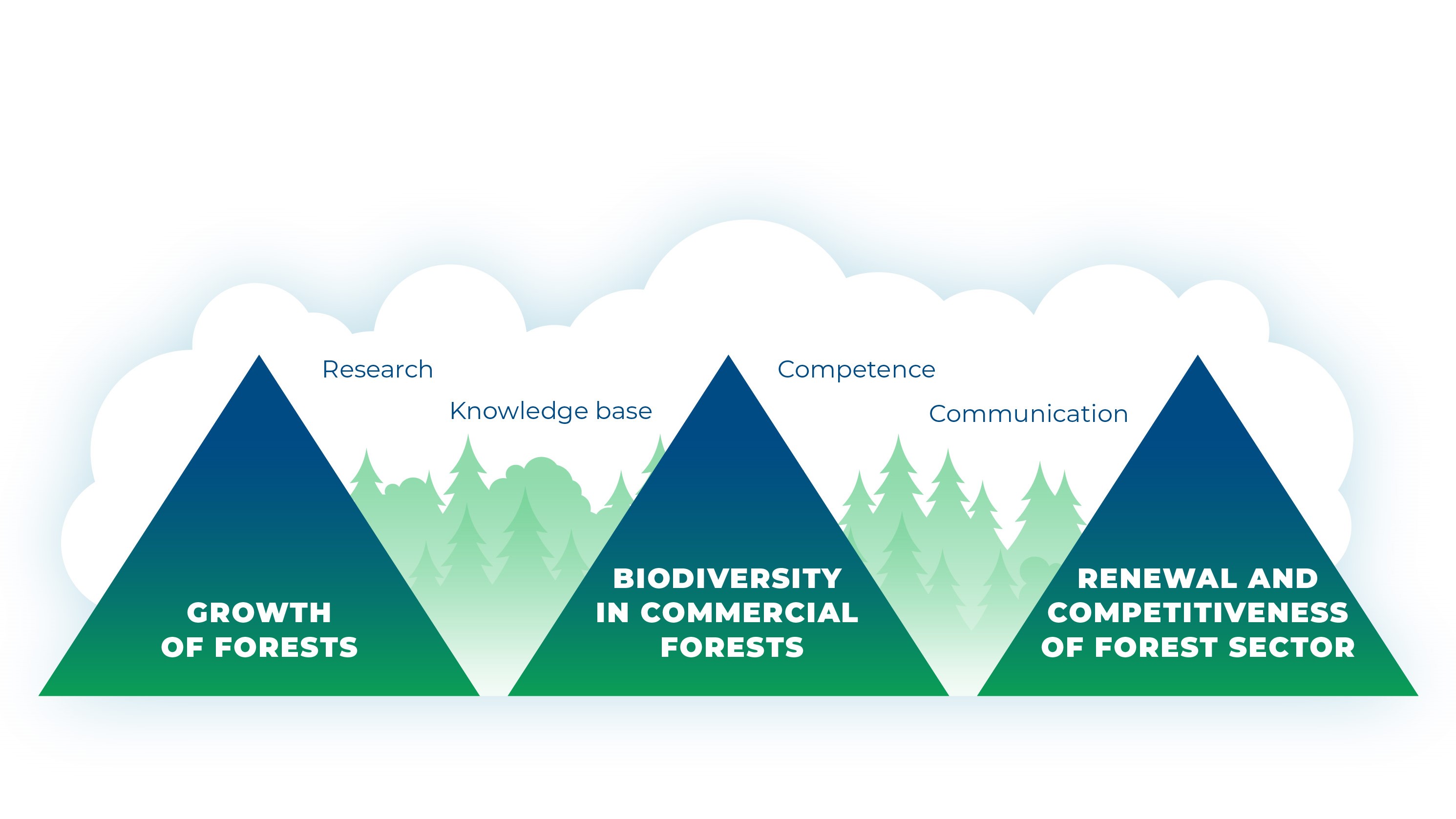Key Projects
The key projects implement the vision, objectives and goals of the strategy together. Each key project affects several objectives and goals, and has a specific task and perspective, but the links between the key projects are strong. It is part of responsible and coordinated strategy implementation that no single key project is promoted in a way that hampers the achievement of all the objectives of the strategy. Cross-project effects will be examined in all key projects. Measures related to coordination are particularly included in the key project Renewal and Competitiveness of the Forest-Based Sector.
Research, the knowledge base, competence, digitalisation, the utilisation of open data, interaction and communication are included in each of the key projects. A separate RDI programme has been drawn up to support the research, development and innovation work of the project portfolio.

The key project Growth of Forests strives to increase forest carbon sequestration and wood production in a profitable, sustainable and responsible manner. Maintaining and increasing the carbon sink and striving to meet the sink and emission targets are part of this key project. The measures will also develop risk management and improve the accessibility of forests. One of the goals of the package is to improve self-sufficiency and security of supply and to create a basis for the functioning of the timber market, the competitiveness of the forest sector and growth.
Measures to increase growth are targeted either at the tree stand or the site. The use of cultivated forest reproductive material and an efficient forest cultivation chain accelerates the growth of the tree stand. The development of the tree stand is influenced by seedling stand management and thinning by regulating tree species ratios, tree density and tree size distribution. Fertilising can increase the growth of trees. Ash fertilisation of peatlands also helps with the water resources management of the site and reduces the need to rebuild ditches. The key project will contribute to the implementation of the Climate Plan for the Land Use Sector.
Rising temperatures and extreme weather phenomena caused by climate change are expected to increase the risk of forest damage in the future. Research, monitoring and foresight are also important for the prevention of forest damage and, consequently, for yield and carbon sinks.
The implementation of the measures needed to increase growth, practical timber harvesting, the prevention of damage and diverse accessibility of forests and sparsely populated areas require a road network that is usable all year round, which is why this key project also includes the maintenance of the road network and bridges, as well as the functionality of the entire logistics chain.
The key project Biodiversity in Commercial Forests develops cost-effective methods based on nature values to turn the development of forest biodiversity onto a path of recovery. The project strengthens the competence and implementation of the methods.
To reconcile forestry, other uses and biodiversity, methods based on nature values are sought that support the goals of forest owners. The measures of the key project are targeted cost-effectively at commercial forests with above-average biodiversity values.
The measures will be used more extensively to implement effective water protection solutions and to develop climate-resilient management of peatland forests. The key project will strengthen the climate resilience and adaptability of forests in accordance with the Climate Plan for the Land Use Sector and the Climate Change Adaptation Plan.
The research will increase knowledge of forest management methods and their impact on biodiversity. The measures of the key project will strengthen the diversity and adaptability of forest nature and reduce the risks of forest damage.
The key project Renewal and Competitiveness of the Forest-based Sector focuses on foresight and knowledge-based management. The measures create a basis for a competitive operating environment for a renewable and sustainable forest-based sector. Key measures include developing skills and training and securing the availability of skilled labour. The development of spatial data is also part of this key project. In addition, innovative development work and long-term forest research are needed.
In order to strengthen business activities, market information will be increased and the activities of forest and nature services enterprises, as well as the prerequisites for recreational use and nature tourism, will be developed. Cooperation, agility and customer-orientation are also needed for the development and coordination of administrative branches and actions by the authorities.
The key project emphasises international interaction, particularly proactive advocacy work in EU and international politics. Resources will be increased for the overall assessment of EU initiatives and position-taking.
Interaction and cooperation will be strengthened, especially with forest owners and young people. The key project will consolidate national and regional measures to increase understanding of forest use, the forest environment and forest culture. The key project Renewal and Competitiveness of the Forest-based Sector places importance on multidisciplinary coordination.
